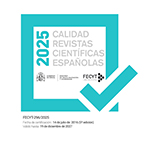“An infinite approximation, as is the approximation of the square to the circle”. Hölderlin on the problem of the ideal
Abstract
Amid a period of isolation and profound internal conflict, both in his life and in his thought, arises that which, according to Hölderlin, is “the general conflict in the human being”, namely the conflict between the “aspiration to limitation” and “the aspiration to the absolute”. The aim of this article is to analyze and, as much as possible, follow to its fullest extent, this fundamental thought: to see how it molds Hölderlin’s positions on existence and philosophy, how it meets the most poignant philosophical concerns of the time and hence directly influences Hölderlin’s reading of Fichte, and how it leads the young poet to the notion of an infinite progression of philosophy, that is, to an infinite approximation to the ideal of knowledge.
Downloads
Article download
License
In order to support the global exchange of knowledge, the journal Revista de Filosofía is allowing unrestricted access to its content as from its publication in this electronic edition, and as such it is an open-access journal. The originals published in this journal are the property of the Complutense University of Madrid and any reproduction thereof in full or in part must cite the source. All content is distributed under a Creative Commons Attribution 4.0 use and distribution licence (CC BY 4.0). This circumstance must be expressly stated in these terms where necessary. You can view the summary and the complete legal text of the licence.












